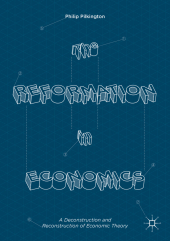 Neuerscheinungen 2016Stand: 2020-02-01 |
Schnellsuche
ISBN/Stichwort/Autor
|
Herderstra▀e 10
10625 Berlin
Tel.: 030 315 714 16
Fax 030 315 714 14
info@buchspektrum.de |

Philip Pilkington
The Reformation in Economics
A Deconstruction and Reconstruction of Economic Theory
1st ed. 2016. 2016. xv, 368 S. 2 SW-Abb., 19 Farbabb. 210 mm
Verlag/Jahr: SPRINGER, BERLIN; SPRINGER INTERNATIONAL PUBLISHING 2016
ISBN: 3-319-40756-2 (3319407562)
Neue ISBN: 978-3-319-40756-2 (9783319407562)
Preis und Lieferzeit: Bitte klicken
This book carves the beginnings of a new path in the arguably weary discipline of economics. It combines a variety of perspectives - from the history of ideas to epistemology - in order to try to understand what has gone so wrong with economics and articulate a coherent way forward. This is undertaken through a dual path of deconstruction and reconstruction. Mainstream economics is broken down into many of its key component parts and the history of each of these parts is scrutinized closely. When the flaws are thoroughly understood the author then begins the task of reconstruction. What emerges is not a ┤Grand Unified Theory of Everything┤, but rather a provisional map outlining a new terrain for economists to explore. The Reformation in Economics is written in a lively and engaging style that aims less at the formalization of dogma and more at the exploration of ideas. This truly groundbreaking work invites readers to rethink their current understanding of economics as a discipline and is particularly relevant for those interested in economic pluralism and alternative economics.
Section I: Ideology and Methodology.- 1. Economics: Ideology or Rationalistic Inquiry?.- 2. The Limiting Principle: A Short History of Ideology in 20th Century Economics.- 3. Deconstructing Marginalist Microeconomics.- 4. Methodology, Modelling and Bias in Economics.- Section II: Stripped-Down Macroeconomics.- 5. Differing Conceptions of Equilibrium in Economics.- 6. Theories of Money and Prices.- 7. Profits, Prices, Distribution and Demand.- 8. Finance and Investment.- Section III: Approaching the Real-World.- 9. Uncertainty and Probability in Economic Theory.- 10. Non-Dogmatic Approaches to the Economics of Trade.- Conclusion and Appendices.- 11. Conclusion.- 12. Philosophical and Psychological Appendices.
Philip Pilkington is a research analyst working in investment management and focusing on macroeconomic research. Prior to working in investment management, Philip ran the popular Fixing the Economists blog and published regularly in various international publications on economic issues. He holds a masters degree in Economics from Kingston University, UK.


